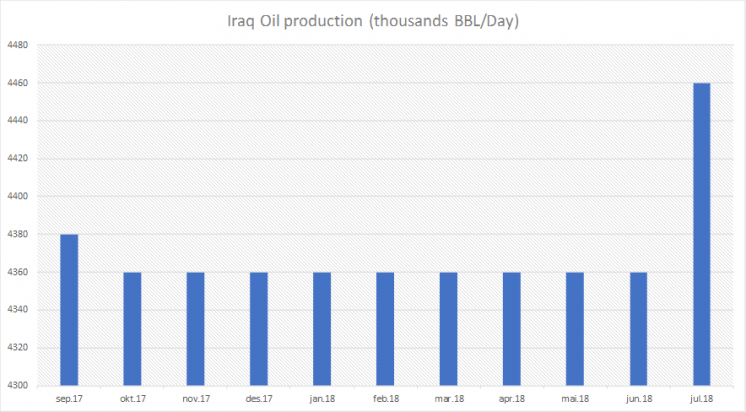
Iraq: citizens in oil producing regions demand a bigger share of revenues
Iraq: citizens in oil producing regions demand a bigger share of revenues
In the midst of violent protests and political uncertainty, Iraq announces highest crude oil production and export levels in over a year.
Crude oil production in the Iraq hit a 13-month high in July at 4.5 million barrels per day (bpd), according to data provided by the Iraqi State Oil Marketing Organization (SOMO) on 9 August 2018. Crude exports are also at their highest level since January 2017 at 3.9 million bpd, up by 25,000 bpd since last month.

SOMO’s data includes exports from the Kurdistan Regional Government (KRG) through the Ceyhan port on the Turkish Mediterranean coast. A previous statement by the Ministry of Oil put total exports in July from its southern ports (not counting KRG) at 3.5 million bpd, putting SOMO’s estimate of exports from KRG at around 242,000 bpd.
Increased production and higher oil sales lead to increased revenues
Higher production has been accompanied by higher oil prices, leading to a substantial increase in government revenues. According to Ministry of Oil data, Iraq’s revenues from crude oil sales in the first half of the year rose to USD 40.35 billion, almost a 46% increase compared to the second half of 2017.
Systematic disclosure provides insight into oil sales
Government data for non-KRG crude exports in June and July show that the average price per barrel continued to rise, from USD 68.75 in June to USD 69.16 in July. The same sources indicate that revenues from crude sales rose from just under USD 7.3 billion in June to USD 7.6 billion in July. Monthly export data from Federal Iraq (not counting KRG exports) is regularly published on SOMO’s website, usually with one month’s delay.
Widespread protests have not affected production
Higher production and exports come at a time when large parts of the country are being rocked by popular protests. For over a month Iraqis have been taking to the streets to express their discontent over poor basic services, corruption, unemployment and lack of progress in Iraq’s reconstruction following the war against Islamic State group.
The protests begun on 8 July in the oil-rich Basra region and quickly spread to other regions in the South. The immediate cause of the protests was Iran’s decision to stop exporting electricity to Dhi Qar, Maysan and Basra provinces due to an estimated USD 1 billion in unpaid electricity bills. With an estimated production of 15,700 megawatts/hour, Iraq depends on Iran to meet its demand of 23,000 megawatt/hour.
Political uncertainty in the backdrop
Disillusionment with the political deadlock following parliamentary elections in May 2018 is believed to have fuelled the protests. Allegations of fraud led Iraq’s parliament to order a manual recount of ballots. Iraq’s Independent High Election Commission (IHEC) released the results of the manual recount on 9 August, noting that its efforts had been hampered by the destruction of all ballots from the capital in a fire hours after parliament ordered the recount. The results published by the IHEC did not alter the initial results significantly and still need to be ratified by Iraq’s Supreme Federal Court. Diplomatic sources contacted by the EITI International Secretariat confirm that protracted negotiations are expected before a government is agreed.
Oil revenue distribution at the source of the conflict
Widespread protests are common in the sweltering summer months, when temperatures average close to 50 degrees Celsius and the power-grid is unable to cope with demand. Protests have been particularly virulent in Basra and other southern districts, which remain some of the poorest in the country despite accounting for roughly 70% of crude production. Whilst the region has been largely spared the insecurity that followed the occupation by Islamic State group of large part of the country, resentment against international oil companies and the central government have spilled over into an estimated 260 protests, acts of sabotage and social unrest in the past year alone.
Building trust and supporting reforms in the sector should be a priority
Improving disclosures on the distribution of extractive industry revenues and subnational transfers were highlighted as priority areas by the International Board of the EITI following a review in 2017 of Iraq’s progress in implementing the EITI Standard. In its decision, the EITI Board noted that “a full transition to the EITI Standard would help provide information that is in high demand in Iraq’s political debate, including clarifying the legal framework and fiscal terms in the sector, the relationship between state-owned enterprises and the government and sub-national transfers. Stakeholder consultations… further highlighted the strong potential for the EITI to contribute actively to the government’s reform agenda”.
EITI acting Executive Director Eddie Rich outlined how the Government of Iraq could use the EITI platform to build trust among stakeholders and support reforms. “By systematically disclosing information that is relevant to the political debate such as how much oil is being produced, exported, sold and used domestically for electricity, the EITI could help inform debate and empower politicians and citizens”.
The EITI is the global standard for transparency and good governance of the extractive industries. Iraq has implemented the EITI since 2012 and was a pioneer in reconciling revenues from oil sales. Iraq underwent Validation in 2017 and was suspended by the EITI Board for having demonstrated inadequate progress in implementing the Standard. Validation is the EITI’s independent quality assurance process. Iraq’s next Validation is scheduled to begin on 26 April 2019.
Contenido relacionado





